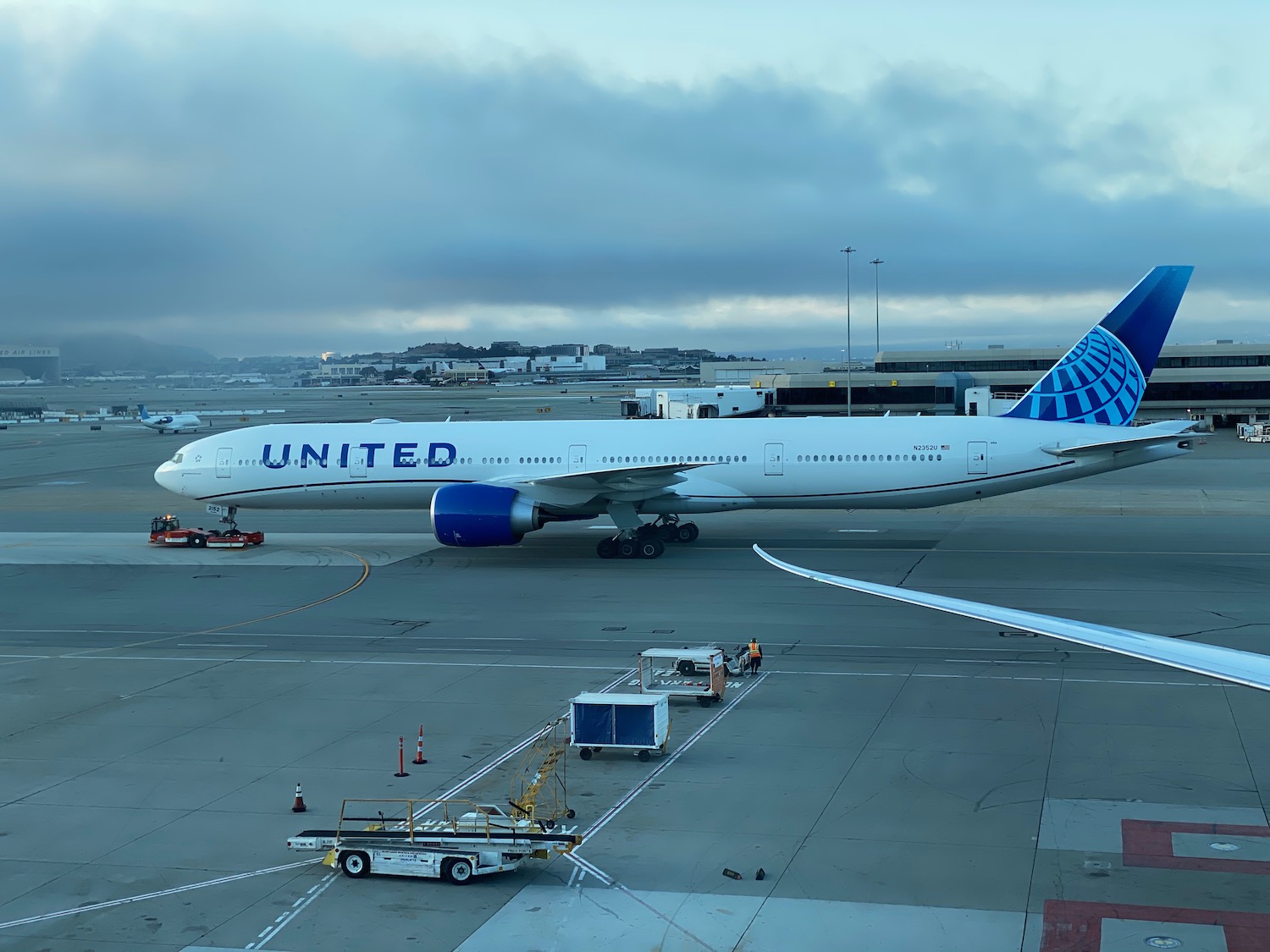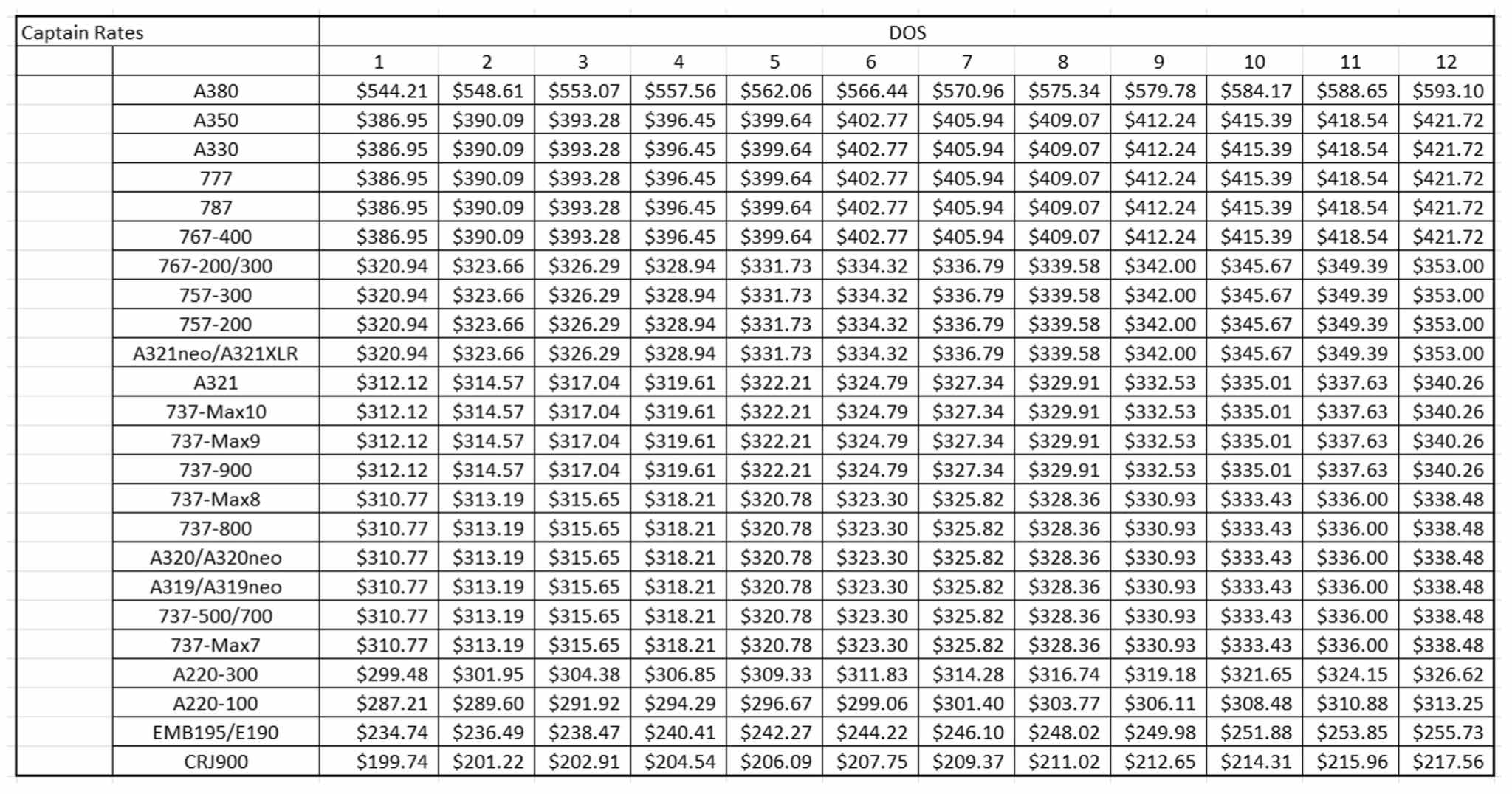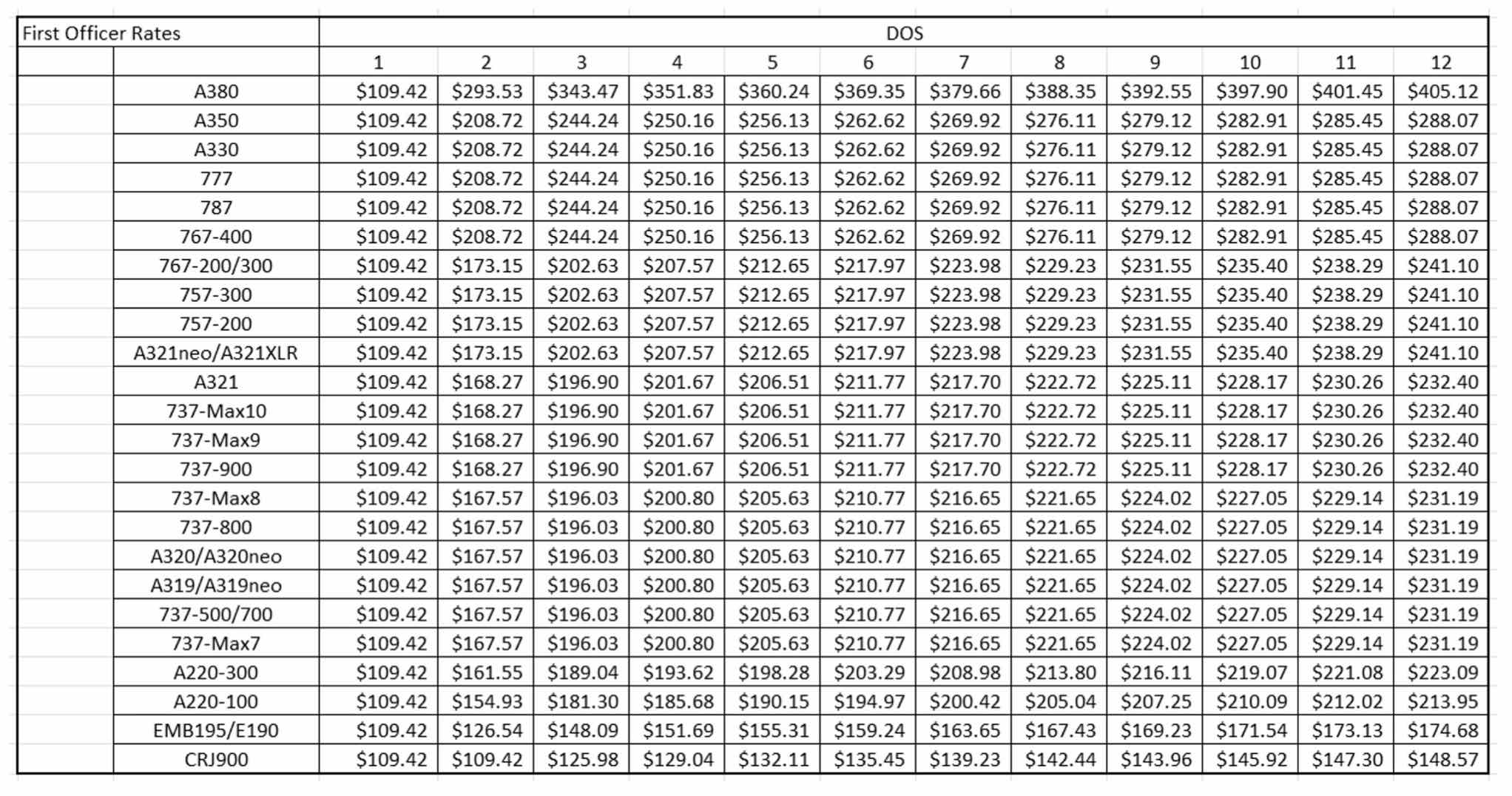
United Airlines and the union representing its pilots have reached an agreement in principle on a new labor contract that would put an additional $10 billion in the pockets of pilots over the next four years, representing up to a 40% raise, and provide more generous benefits.
United Airlines Reaches Agreement In Principle With Pilots Union Over New Contract
On Saturday afternoon, the Airline Pilots Association (ALPA) and United struck a deal that would give pilots the pay and benefit increases they have long been seeking. Let’s take a look at the particulars.
Pay Raises Of Up To 40%
Under the proposed deal, pilots will see across the board pay raises of up to 40% over the next four years. The proposal included the following chart indicating pay based upon airline type. Add three zeros to roughly determine what a captain or first officer would be paid per year:


(note – while it is HIGHLY unlikely that United would ever acquire Airbus A380 jets, every aircraft is included just in case)
Because of a “snap up” clause in both the Delta and United (proposed) contract, both will see an immediate 1% raise over the figures above.
Pilots will see:
- 2023 – 14-18% pay raise
- 2024 – 5% pay raise
- 2025 – 4% pay raise
- 2026 – 4% pay raise
- 2027 – 3% pay raise
Furthermore, pilots will receive a lump sum “backpay” for the last three years, including:
- 2020 – 4%
- 2021 – 4%
- 2022 – 14%
- 2023 – 14% (for first half of year)
There is also more pay for holidays, training, and an increased reserve minimum guarantee.
Profit Sharing
In addition to the pay raise, pilots will enjoy a generous profit sharing plan with the company that matches what Delta pilots now enjoy including:
- 10% of profits up to $2.5 billion
- 20% of profits over $2.5 billion
Enhanced Benefits
Among new benefits this deal would bestow include:
- extended sick leave
- kin care
- more flexible vacation time
- two week of parental leave (currently only paid maternity leave is available)
- increased per diems
- parking stipend
Interestingly, a clause specifically states that the company cannot require vaccines or medical procedures from pilots (beyond what is required by the FAA).
Stringent Scope Clause Remains In Effect
In this “pilot’s market” United got very little in return. There was some speculation that in exchange for such a lucrative pay raise, pilots might be amenable to (slightly) loosening the scope clause which regulates the number of seats United can offer on a subsidary-operated regional jet and also limits the ratio of regional jets to mainline jets in the United fleet.
The current scope clause would remain in effect, meaning that 1.) United cannot offer regional jet service with more than 76 seats unless operated by mainline pilots and 2.) if United furloughs even a single mainline pilot, six seats would have to be removed form every 76-seat regional jet.
What United CEO Scott Kirby Is Saying About The Deal
CEO Kirby posted a congratulatory note across social media channels praising the deal and noting that it would enable United Next to proceed according to plan:
We promised our world-class pilots the industry-leading contract they deserve, and we’re pleased to have reached an agreement with ALPA on it. The four-year agreement, once ratified, will deliver a meaningful pay raise and quality of life improvements for our pilots while putting the airline on track to achieve the incredible potential of our United Next strategy.
Markets have reacted favorably to the deal, with United’s stock up slightly in pre-market trading.
What’s Next For United Pilots?
While an “AIP” has been reached, the fine print will now be hashed out over the next several weeks. At that point, pilots will have five days to review the new contract before a vote is taken. A majority vote is needed to ratify the new contract.
Is This Too Generous Of A Contract?
There is some concern that a contract this generous is unsustainable. Pilots, however, argue this is simply playing catch-up for two decades of wage stagnation and that when adjusted for inflation, these new rates will remain lower than pre 9-11-2001 pay.
Compared to American Airlines or Delta Air Lines, United Airlines has a much more robust longhaul network. Longer flights (over eight hours) require three pilots while ultra-long haul flights (over 12 hours) require four pilots. Airlines do not publish the profitability of a specific route, but often operate on thin margins. Will certain routes become unsustainable (or at least comparatively less attractive) when these new labor costs are factored in?
Pilots currently have a tremendous upper hand in negotiating due to a pilot shortage in the United States. But what happens when the pilot supply and demand have been equalized and the next recession hits?
That’s largely speculation for another day, but 1.) I don’t believe paying pilots more makes flying safer and 2.) I do wonder if United will be able to pass on these labor increases directly to consumers versus higher ticket prices. It is hard to feel sorry for pilots complaining that $300K is not enough and they need $500K per year.
But that’s really not the concern of pilots or the union right now: congrats to them for securing such a lucrative deal.
CONCLUSION
United has reached a tentative agreement with its pilots over a new four-year labor contract worth $10 billion. While the final details must be hashed out, this represents a breakthrough in a years-long back and forth between management and unions over a new deal.
What are your thoughts on the new United Airlines pilots contract?




Pilots currently have a tremendous upper hand in negotiating due to a pilot shortage in the Untied States.
The name of our country changed?
My hope was that they could get the A319 and B737-7 rates low enough to make it profitable to fly many RJ routes now operated by 3rd parties. I guess that is for another day.
I think airlines will quickly begin to embrace a single pilot flight deck with these kind of costs. It’s simply unsustainable.
In a decade it’ll be a million a year.
While everyone may now seem happy and relieved, this deal is setting the industry up for some huge drama in the future. As soon as leisure travel begins to fall (it will happen soon) from its recent and current surge, and business travel fails to rebound from the pre-covid days, there will be a reckoning. And it will be a painful one. I hope they are stashing away their bonuses and extra salary…they will need it soon. And no, this next time there will be no bailouts to save their jobs.
I know political positions aren’t directly comparable to private sector jobs, but I still think that there’s something wrong with the world, or perhaps at least with the USA, when someone gets paid well over the salary of the President of the French Republic and more than twice the salary of the Prime Minister of Spain just because they’re certified to fly a bloody Embraer.
While the taxpayer were subsidizing their job, the pilots are now asking for backpay on top of that for 2020 and 2021. This is mindboggling. Autonomy needs to arrive faster and faster. Startups like xwing need to succeed. The traveling public is not a cashcow to enrich fat cats.
Don’t worry, pilots love to tell you how underpaid they are after getting bailed out three times.
Ok this is truly hilarious that you’re blaming the PILOTS for bailouts the CORPORATIONS received.
The pilots didn’t spend all their money on buying back shares for a decade. The pilots didn’t decide to crawl to the government instead of reissuing shares to stay afloat. The pilots just did their jobs and created revenue for the airlines with their labour.
Because you are able to strong arm a highly advantageous deal doesn’t necessarily mean you should, or that it’s for the best in the end. It does not promote long term stability.
Given the United chaos recently I question all of the decisions have an aurora of fantasy.
Flights are full and fares through the roof. Add that to the shortage and they had a lot of leverage. Question is whether it’s sustainable over the long haul. Curious if this will create animosity among the other labor groups at UA?
Interesting that you publish the salary by numbers. With no other way to get to and from long distances except by airplane, It’s WE the People who will be paying for this…
Well, I guess we can kiss goodbye upgraded int’l business class meals!
The fact that Kirby is cheering about this unsustainable debacle of a contract is telling about his executive ineptitude.
The pilots aren’t doing themselves any favors here either. Their shortsighted greed in ramming through a blatantly unsustainable contract will just accelerate the discussion about single pilot cockpits.
I don’t begrudge pilots using the current climate to negotiate a raise– if they don’t do it now, when will they, and with the way inflation has gone recently everyone wants a raise, but….. backpay that amounts to roughly 30% of your salary and 35% over the next 4.5 years? Wow. That’s pretty incredible.
These semi-monopolies are completely shameless.
We paid to keep them employed. Now they’re coming for more. Duck them all.
Wait a minute. Management will probably not want to pay for this. Neither will the people. I flew on a United flight and the (women) pilots had a New Zealand accent. I think Management will be willing to contract out pilots from other countries just to pay them less (if that isn’t against union rules). Just like in the medical profession, nurses are contracted from the outside just so management won’t have to pay them as much. In this situation, I am assuming these New Zealand pilots, (again my assumption) might have been contracted out from Air New Zealand, a Star Alliance airline.
United does not contract out their pilots from
Other countries or sponsor foreign pilots. They have their pick of the liter for hiring pilots in the US. This new contract will ensure that for years to come.
As others have pointed out, this will push airlines to start looking at single pilot flight decks. I’ll go one step further; by century’s end AI and some guy in a control room will be taking care of everything. It’s inevitable. In the next few years pilots unions will be like SAG unions; fighting to keep AI out of their industries. Now flight attendants will want their due and it will prove to be unsustainable when the next downturn happens.